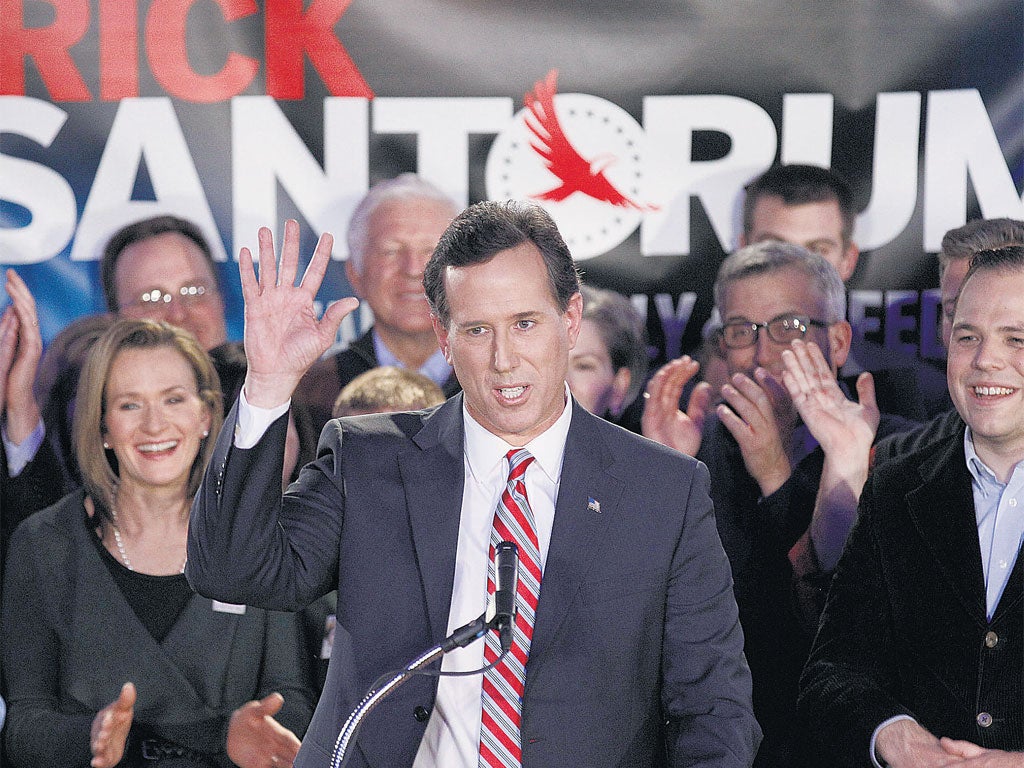Leading article: And the winner in Iowa was... Barack Obama
What looked like a genuine window of Republican opportunity may now be about to close

Your support helps us to tell the story
From reproductive rights to climate change to Big Tech, The Independent is on the ground when the story is developing. Whether it's investigating the financials of Elon Musk's pro-Trump PAC or producing our latest documentary, 'The A Word', which shines a light on the American women fighting for reproductive rights, we know how important it is to parse out the facts from the messaging.
At such a critical moment in US history, we need reporters on the ground. Your donation allows us to keep sending journalists to speak to both sides of the story.
The Independent is trusted by Americans across the entire political spectrum. And unlike many other quality news outlets, we choose not to lock Americans out of our reporting and analysis with paywalls. We believe quality journalism should be available to everyone, paid for by those who can afford it.
Your support makes all the difference.There are dangers in over-interpreting the results of the Iowa caucuses. As the first vote of a US primary season that begins earlier and earlier, it cannot be regarded in any way as representative or predictive of what is to come. The particular character of Iowa, rural and conservative, is always likely to favour candidates of a similar stamp, while placing others at a corresponding disadvantage. The very different character of New Hampshire, whose primary takes place next week, and still more of South Carolina, a further 11 days away, makes for a more complete picture of the nomination fight.
Yet this does not mean that conclusions cannot be drawn from this year's Republican contest in Iowa. Indeed, the first was drawn yesterday with commendable dispatch by Michele Bachmann, who announced that she would not campaign in South Carolina and was effectively ending her bid. Rick Perry of Texas was also said to be considering his position.
The failure of Ms Bachmann, an Iowa native, to come higher than sixth (in a field of nine) suggests that the appeal of the populist Tea Party movement may have peaked – was it any more than an entertaining trend for voters to flirt with between presidential elections, but not when it came to the serious stuff? Or perhaps it was Ms Bachmann herself, rather than her allegiance, that was found wanting on closer acquaintance.
Either way, the fact that Iowa's grass-roots Republicans preferred mainstream representatives, and even the libertarian Ron Paul, to someone associated with the flakier Tea Party will reassure many Republicans. Ms Bachmann meanwhile may ponder the fickleness of her home state's voters: she had won the big political event of last summer, the Iowa straw poll. Then it was downhill pretty much all the way.
The veteran conservative, Newt Gingrich, survived to fight another day, and can reasonably wait until South Carolina to calculate his chances of a comeback. But the surprise of Iowa was the close finish that the favourite, Mitt Romney, was forced into by Rick Santorum, the former Pennsylvania senator. His margin of victory was only eight votes in a strong turnout. As much as the decline of the Tea Party, if that is what it is, could be bad news for Barack Obama, presenting American voters with a more plausible Republican alternative, the prospect of a close and protracted race for the Republican nomination is entirely in Mr Obama's interests.
Mr Santorum could turn out to be a one-day, or one-month, wonder. Prepossessing and articulate, he nonetheless carries political baggage from his time as a senator. His early showing may also be deceptive, as Mr Romney decided to join the Iowa contest only at a comparatively late stage. Mr Romney, however, is far from home and dry. While he should do well in New Hampshire, as a New Englander and former Governor of neighbouring Massachusetts, his key test will be South Carolina, where it should become apparent how far, if at all, his Mormon religion will be an electoral liability. This is not the sort of thing voters divulge in opinion polls; it emerges only at the ballot box.
One parallel, for Republican front-runners, will be 1992, when Bill Clinton came from a backwoods governorship to deprive George HW Bush of a second term. This seemed to be in Mr Santorum's mind when he was thinking aloud about whether to run. What once looked like a genuine window of Republican opportunity, however, could be starting to close. The more consistent the economic upturn and the longer and more divisive the Republican search for a presidential nominee, the better become Mr Obama's prospects of a second term. The Iowa result was in that sense even more of a victory for him than it was for any Republican.
Join our commenting forum
Join thought-provoking conversations, follow other Independent readers and see their replies
Comments